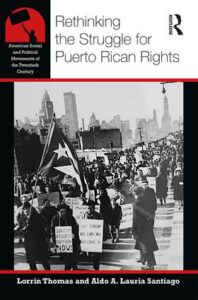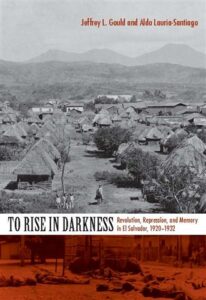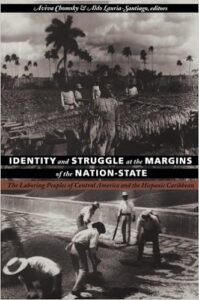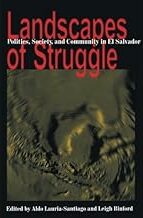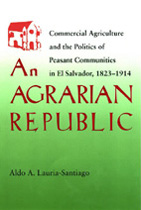Books
- Puerto Rican New Yorkers: Class, Community and Labor, 1915-1950. Under contract and in final review with the University of North Carolina Press.
- Co-edited with Ulla Berg. Latinos in New Jersey. 15 Chapters. Forthcoming with Rutgers University Press.
- Co-authored with Lorrin Thomas. Rethinking the Struggle for Puerto Rican Rights. Routledge. 2018. 220pp.
- Co-authored with Jeffrey Gould. To Rise in Darkness: Revolution, Repression and Memory in El Salvador, 1929-1932. Duke University Press. 2008. 368pp.
- Published in Spanish as: 1932: Rebelión en la oscuridad. San Salvador: Museo de la Palabra y la Imagen. 2008.
- Co-Editor with Leigh Binford. Landscapes of Struggle: Community and Politics in El Salvador. University of Pittsburgh Press, 2004.
- An Agrarian Republic: Commercial Agriculture and the Politics of Peasant Communities in El Salvador, 1823-1914. University of Pittsburgh Press, 1999. 326pp.
- Published in Spanish as: Una República Agraria. San Salvador: CONCULTURA, Ministry of Education, 2003.
- Co-Editor with Aviva Chomsky, Identity and Struggle at the Margins of the Nation-State: The Laboring Peoples of Central America and the Hispanic Caribbean. Duke University Press, 1998.
Books in progress
- A Better Life: Class, Work and Struggle in New York’s Puerto Rican Communities, 1945-1976. Seven chapters drafted, two in process.
- Peasant Communities, Coffee Production, and Ethnicity in Eastern Mexico, 1830-1910. Two Chapters drafted.
Rethinking the Struggle for Puerto Rican Rights
Lorrin R. Thomas & Aldo A. Lauria Santiago
Routledge, 2018
Rethinking the Struggle for Puerto Rican Rights offers a reexamination of the history of Puerto Ricans’ political and social activism in the United States in the twentieth century. Authors Lorrin Thomas and Aldo A. Lauria Santiago survey the ways in which Puerto Ricans worked within the United States to create communities for themselves and their compatriots in times and places where dark-skinned or ‘foreign’ Americans were often unwelcome. The authors argue that the energetic Puerto Rican rights movement which rose to prominence in the late 1960s was built on a foundation of civil rights activism beginning much earlier in the century. The text contextualizes Puerto Rican activism within the broader context of twentieth-century civil rights movements, while emphasizing the characteristics and goals unique to the Puerto Rican experience. Lucid and insightful, Rethinking the Struggle for Puerto Rican Rights provides a much-needed introduction to a lesser-known but critically important social and political movement.
To Rise in Darkness: Revolution, Repression, and Memory in El Salvador, 1920-1932
Jeffrey L. Gould & Aldo A. Lauria-Santiago
Duke University Press, 2008
“To Rise in Darkness tells the story of the 1932 Communist-led uprising in El Salvador and the violent repression that followed, one of the most consequential events in Latin American history. As a prelude to the widespread terror that would sweep throughout Central America during the Cold War, this killing is beginning to receive scholarly attention, yet To Rise in Darkness will be the touchstone for future discussion of the 1932 revolt and massacre. Based on painstaking research and exhibiting a sharp conceptual focus, this book will influence scholarship on the relationship between political mobilization, ideology, and violence for years to come.” –Greg Grandin, author of The Blood of Guatemala: A History of Race and Nation
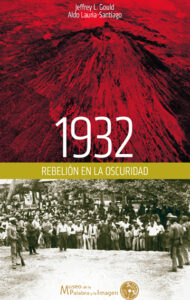
1932: Rebelión en la oscuridad
Jeffrey L. Gould & Aldo A. Lauria-Santiago
Museo de la palabra y la imagen, San Salvador, 2008
Identity and Struggle at the Margins of the Nation-State: The Laboring Peoples of Central America and the Hispanic Caribbean
Aviva Chomsky & Aldo Lauria-Santiago
Duke University Press, 1998
“This collection gives us a much more nuanced view of labor in these regions than previously available. Using archives and oral history, the writers successfully break through the screen of elite-centered history into the world of the masses.” –David McCreery, Georgia State University
“This volume does an exceptional job of bringing together in a single volume very substantial new research on working people and their history in the Hispanic Caribbean Basin.” –Ralph Lee Woodward Jr., Tulane University
Landscapes of Struggle: Politics, Society, and Community in El Salvador
Edited by Aldo Lauria-Santiago and Leigh Binford
University of Pittsburgh Press, 2004
“An excellent example of a new generation of scholarship on El Salvador. It represents a concerted effort to apply the insights of subaltern studies, gender studies, historical anthropology, and cultural studies to the understanding of the country’s past.” –Héctor Lindo-Fuentes, Director of the Latin American and Latino Studies Institute, Fordham University
“Rarely has history met contemporary cultural and political analysis of Latin America on such fertile terrain. . . .A fresh, critical, interdisciplinary lens.” –Charles R. Hale, University of Texas
An Agrarian Republic: Commercial Agriculture and the Politics of Peasant Communities in El Salvador, 1823-1914
Aldo Lauria-Santiago
University of Pittsburgh Press, 1999
With unprecedented use of local and national sources, Lauria-Santiago presents a more complex portrait of El Salvador than has ever been ventured before. Using thoroughly researched regional case studies, Lauria-Santiago uncovers an astonishing variety of patterns in land use, labor, and the organization of production. He finds a diverse, commercially active peasantry that was deeply involved with local and national networks of power. An Agrarian Republic challenges the accepted vision of Central America in the nineteenth century and critiques the “liberal oligarchic hegemony” model of El Salvador. Detailed discussions of Ladino victories and successful Indian resistance give a perspective on Ladinization that does not rely on a polarized understanding of ethnic identity.
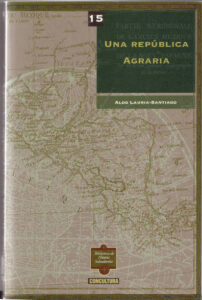
Una República Agraria
Aldo Lauria Santiago
CONCULTURA, Ministerio de Educacion, El Salvador 2003
Una república agraria representa un avance trascendental en la historiografía Salvadoreña. Aldo Lauria-Santiago fue el primer académico que utilizó de manera extensa los archivos salvadoreños, y su tesis doctoral—que sirvió de base para el presente libro—fue el primer estudio exhaustivo basado en dicha documentación.
El libro arranca con un análisis de la tenencia de la tierra. El campesinado y la economía agrícola salvadoreña entre 1821 y 1880, es decir, después de la independencia de España y antes de la consolidación del estado liberal. Entre sus planteamientos, quizás el más destacado es el que se refiera al papel relevante del campesinado en la historia de la post-independencia de El Salvador. El autor sostiene que los campesinos conservaron un acceso a los recursos de la tierra durante un periodo mas dilatado y en proporciones mayores a los que anteriormente se creía.
